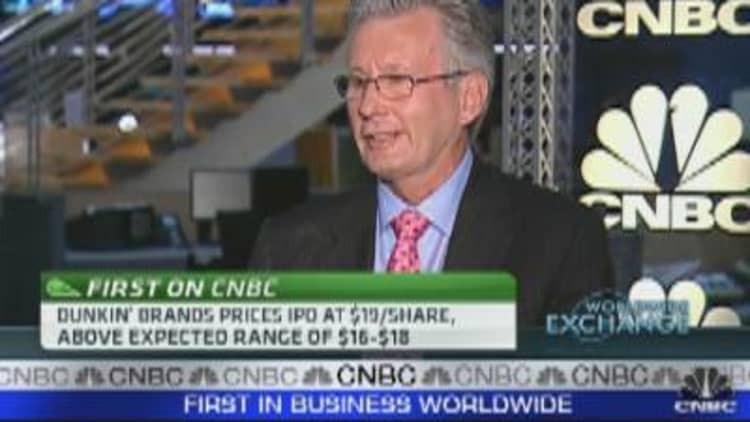Fred the Baker would be proud. CEO Nigel Travis is.
"We are lucky,” Dunkin’ Brands CEO Travis said this morning on CNBC’s “Worldwide Exchange” during his first interview since the company’s IPO was announced. “We have three great growth stories, with our comps which is important. We invest some money into marketing, besides the money that our franchisees invest.”
Analyst Will Slabaugh of Stevens said that the company’s recognition as a household brand would predictably help to push the initial public offering to the high end of the expected IPO range, which fluctuated between $16 to $18 per share.
“There have been a lot of inbound calls, a lot of interest out there. People want to own this brand,” Slabaugh said. “It’s one that people are familiar with, it’s a high quality franchise model growth name.”
He said that investors were especially interested in the company’s franchise model, in which stores are owned and operated by smaller franchisees under the direction and development of the parent company.
“With commodity prices as high as they are and as volatile as they are, having that franchise model to be able to diversify out and not have that exposure to rising coffee prices—that is very attractive to investors,” Slabaugh said. “You just get that steady revenue stream and your earnings are much more stabilized.”
"Being a franchise system is a great model for us as a company because it is an asset light model,” Dunkin's Travis said, referring to the model’s structure in which the physical stores are owned by the franchisees, resulting in fewer actual assets—and higher revenue—for the parent company. “But it all comes down to franchise relationships and franchise profitability.”
Under the new listing, Dunkin’ will keep the franchise model—albeit with the heightened scrutiny that comes along with having to report earnings and other information to the public.
The company’s slogan has been “America Runs on Dunkin’ ” since 2006, but the majority of the company’s stores are in the Northeast; in fact, only 75 franchisees exist west of the Mississippi River (mostly in Arizona, Nevada, New Mexico, and Texas) and there is only one Dunkin' Donuts on the West Coast, located in Portland, Oregon.
Westward expansion will be part of the growth strategy moving forward, an announcement which excited investors for this morning’s fundraising haul of $422.75 million. Funds will also be used to pay down the company’s debt, which currently stands at around 9 percent.
“We are moving further west, but principally we are growing in the center part of the country and then internationally is a huge growth opportunity for us,” Travis said. Shares of Dunkin’ Brands were priced at $19 as part of the IPO and its shares jumped more than 37% to $26.22 in early trading after their debut on Wednesday.
Since it was founded in 1950, Dunkin’ has become a $6 billion-plus company in terms of annual revenue, and expanded to include more than 9,700 Dunkin’ Donuts stores across the world— including 6,700 in the U.S. alone. Dunkin’ Brands also owns ice-cream giant Baskin-Robbins, with 5,800 stores worldwide. The franchise model has kept Dunkin’ more insulated from food price fluctuations than its competitors, since individual stores can adjust to changing prices and the availability of ingredients on a local level.
“One of the problems with owning stores yourself is you get the volatility of costs going up and costs going down,” Travis said, adding that less volatility translates into a better and more consistent value for the customer. “Our franchisees have been very slow to increase our prices because at the end of the day, Dunkin’ Donuts is about value, and so they have managed to not only manage their costs but maintain our value position."
The company used to be more of a baked goods outfit, but in recent years has focused more on beverages—60 percent of its business now comes from coffee.
“Beverages are important because they have such high margins,” Travis said.
Along with trying to maintain consistent value across franchises, a huge part of the company’s success—especially in the Northeast—has been brand loyalty, with partnerships with sports teams such as the Boston Celtics helping to make the brand a cultural landmark.

Slabaugh cited recent independent research, which he said suggested that Dunkin’ Donuts is as loyal or more loyal of a brand as Starbucks .
“The big question in people’s minds is can you translate that strong loyalty from the Northeast to the western U.S.,” he said. “That’s where investors are placing their bets, on whether that unit growth story really plays out and can translate into the rest of the country.”
Dunkin’ will be aided in its westward expansion with the brand recognition that already exists from its bagged coffee sold in grocery stores, which makes up about 7 percent of the company’s revenue.
“It’s a very attractive piece that consumers already know,” Slabaugh said. “Putting one on the street corner is a little less risky when it’s already out in the consumers mind.”
“I met someone the other week who went to Dunkin’ seventeen times a week,” Travis said. “So I said to him, 'What do you do at Christmas?' ”
The customer responded: “'I make sure everyone has Dunkin’ gift cards.”

